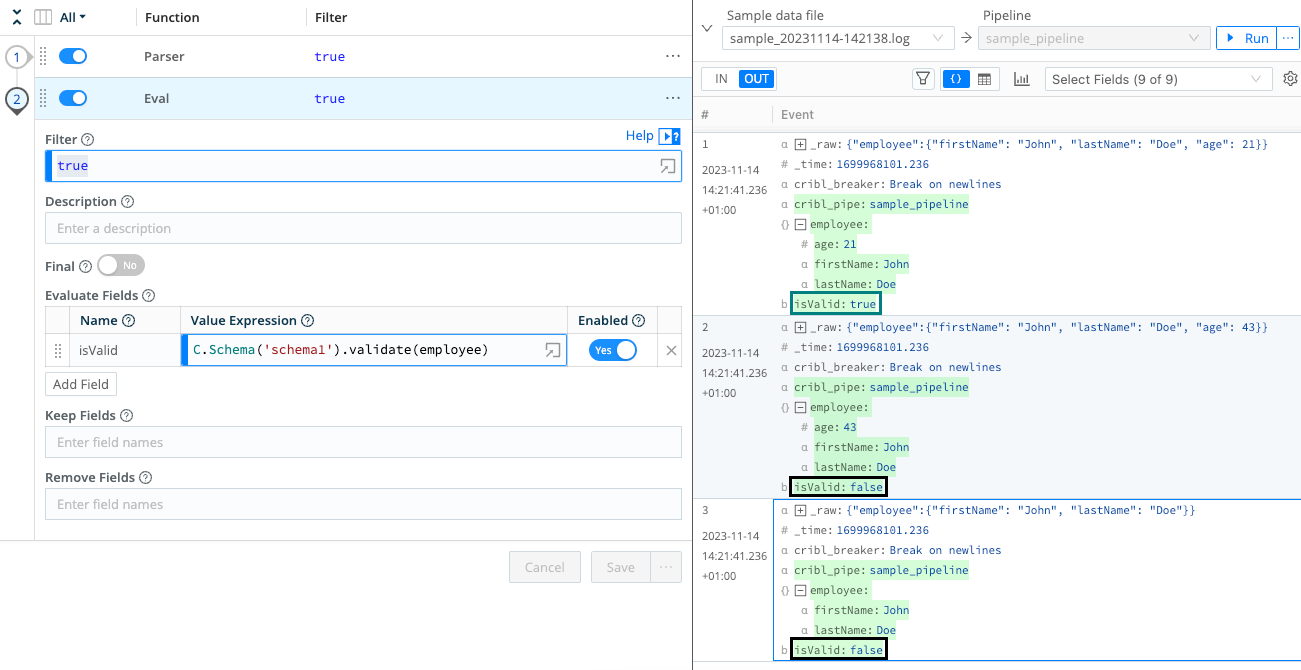These docs are for Cribl Edge 4.3 and are no longer actively maintained.
See the latest version (4.16).
Schemas Library
Cribl Edge supports two kinds of schemas:
- JSON schemas for validating JSON events. This page outlines how to manage these in the UI at Knowledge > Schemas.
- Parquet schemas for writing data from a Cribl Edge Destination to Parquet files.
These schemas obviously serve different purposes. Beware of assuming that operations that work for one kind of schema can be used with the other. For example, the validation method for JSON schemas - C.Schema('<schema_name>').validate(<object_field>) - can’t be used to validate Parquet schemas.
JSON Schemas
JSON schemas are based on the popular JSON Schema standard, and Cribl Edge supports schemas matching that standard’s Drafts 0 through 7.
You can access the schema library from Cribl Edge’s top nav under Processing > Knowledge > Schemas. Its purpose is to provide an interface for creating, editing, and maintaining schemas.
You validate a schema using this built-in method: C.Schema('<schema_name>').validate(<object_field>).
You can call this method anywhere in Cribl Edge that supports JavaScript expressions. Typical use cases for schema validation:
- Making a decision before sending an event down to a destination.
- Making a decision before accepting an event. (E.g., drop an event if invalid.)
- Making a decision to route an event based on the result of validation.
JSON Schema Example
To add this example JSON Schema, go to Processing > Knowledge > Schemas and click New Schema. Enter the following:
- ID:
schema1. - Description: (Enter your own description here.)
- Schema: Paste the following schema.
{
"$id": "https://example.com/person.schema.json",
"$schema": "http://json-schema.org/draft-07/schema#",
"title": "Person",
"type": "object",
"required": ["firstName", "lastName", "age"],
"properties": {
"firstName": {
"type": "string",
"description": "The person's first name."
},
"lastName": {
"type": "string",
"description": "The person's last name."
},
"age": {
"description": "Age in years which must be equal to or greater than zero.",
"type": "integer",
"minimum": 0,
"maximum": 42
}
}
}Assume that events look like this:
{"employee":{"firstName": "John", "lastName": "Doe", "age": 21}}
{"employee":{"firstName": "John", "lastName": "Doe", "age": 43}}
{"employee":{"firstName": "John", "lastName": "Doe"}}To validate whether the employee field is valid per schema1, we can use the following:C.Schema('schema1').validate(employee)
Results:
- First event is valid.
- Second event is not valid because
ageis greater than the maximum of42. - Third event is not valid because
ageis missing.






